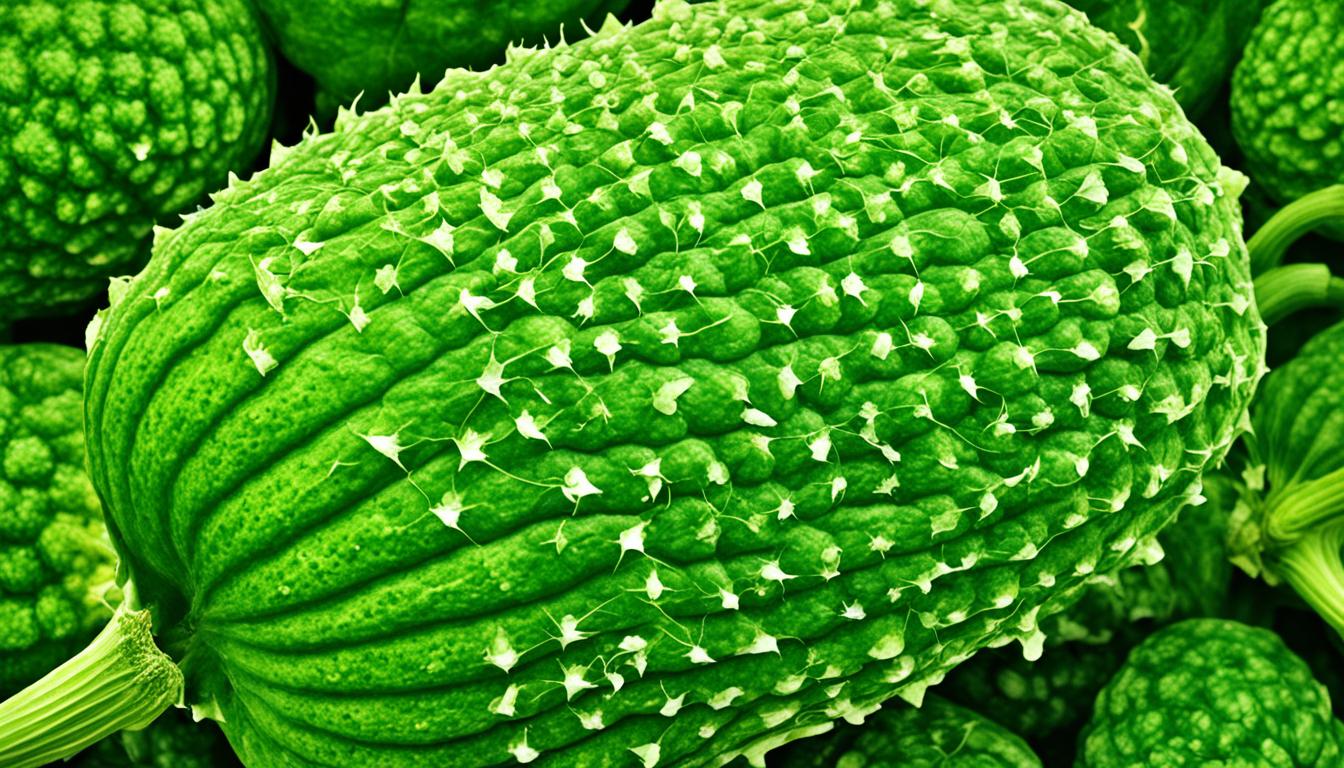100 grams of raw bitter melon gives you 99% of the Daily Value (DV) for vitamin C. This tropical fruit isn’t just full of nutrients. It has many health benefits too. Bitter melon is common in Asia. Its nutrient profile and medicinal properties are great for your health.
Bitter melon comes from a tropical vine in the gourd family. It’s like zucchini, squash, pumpkin, and cucumber. People all over the world grow it for its fruit, which is a key part of Asian dishes. Bitter melon is rich in vitamin C, vitamin A, folate, and fiber. It has a lot of strong antioxidants. Studies have found it can help with blood sugar, boost immunity, and more. It might even help with weight loss and could fight cancer.
Key Takeaways:
- Bitter gourd is a nutrient-dense fruit packed with vitamins, minerals, and antioxidants.
- It may help regulate blood sugar levels, improve immunity, and support respiratory and skin health.
- Bitter gourd may also aid in weight loss and exhibit potential cancer-fighting and cholesterol-lowering properties.
- The fruit’s unique bitter taste can be balanced and enjoyed in various culinary applications.
- Moderation is key when consuming bitter gourd, as it may interact with certain medications or cause side effects in some individuals.
What is Bitter Gourd?
Bitter gourd is a vine from the gourd family. It’s known by names such as bitter melon and Momordica charantia. This vine group includes zucchini, squash, pumpkin, and cucumber.
A Member of the Gourd Family
Belonging to the Cucurbitaceae family, it is a vine with bumpy, oblong fruits. This family also has melons and squashes. Bitter gourd thrives in warm climates, widely grown in tropical and subtropical areas.
Cultivated Worldwide for Its Edible Fruit
It’s a popular crop found around the globe. Tropical and subtropical areas are its key cultivation zones. Places like Asia, Africa, and the Caribbean use it a lot in their cooking. In these regions, it’s a key ingredient of many traditional dishes.
Distinct Appearance and Flavor
Its fruit is easily recognized by its bumpy, ridged skin. A light green to white in color, it’s known for its intensely bitter taste. This bitterness is why it’s called “bitter melon” or “bitter gourd.”
Bitter Gourd Nutrition Facts
Bitter gourd, or bitter melon, is packed with key vitamins and minerals. In just 100 grams, you get only 21 calories, 4 grams of carbs, and 2 grams of fiber. It’s a powerful option for essential nutrients.
Low in Calories, High in Fiber
Even though it tastes bitter, bitter gourd is a smart choice for low-calorie, high-fiber eating. A 100-gram serving has only 21 calories but supplies 2 grams of fiber. This is about 8% of what you need each day.
Rich in Vitamins and Minerals
Bitter gourd is full of important vitamins and minerals. It gives 99% of the Daily Value for vitamin C and 44% for vitamin A. You’ll also get 17% of the DV for folate, along with some potassium, zinc, and iron.
Packed with Antioxidants
This fruit also offers significant antioxidants. Compounds like catechin, gallic acid, and chlorogenic acid help protect cells. These properties, among others, could be the reason for the fruit’s many health benefits.
Bitter Gourd Nutrition Facts: Incredible Health Benefits
Bitter gourd is packed with important nutrients. These include fiber, vitamins, minerals, and antioxidants. Studies show it might help control blood sugar, boost immunity, and more. The special compounds in bitter gourd, like charantin and vicine, are key to its health benefits.
It’s a top source of vitamins and minerals. Bitter gourd contains 99% of the Daily Value for vitamin C and 44% for vitamin A. It also has 17% of the DV for folate, plus some potassium, zinc, and iron. Its antioxidants protect cells from damage.
This veggie is famous for its effect on blood sugar. It has compounds that work like insulin, helping to lower blood sugar. This can lead to better long-term blood sugar control.
Bitter gourd also benefits the body in many other ways. Its antioxidants can boost immunity, aid skin health, and help in weight loss. They might even have anti-cancer and cholesterol-lowering effects. Adding bitter gourd to your diet could be really good for you.
Controls Blood Sugar Levels
Bitter gourd is well-known for helping with diabetes issues. Studies show its ability to lower blood sugar. This is because it has ingredients that act like insulin. They help process sugar better, leading to lower blood sugar levels and improved long-term control.
Rich in Compounds that Mimic Insulin
Research revealed a positive effect of taking 2,000 mg of bitter melon daily for 3 months on people with diabetes. This dosage reduced blood sugar and HbA1c levels. Another study mentioned that a 2,000 mg daily dose for 4 weeks lowered blood sugar and fructosamine levels.
Improves Glucose Metabolism
Bitter gourd seems to improve sugar use and boost insulin production. Insulin regulates blood sugar levels. So, adding this to diets could help manage diabetes and related conditions well.
Boosts Immunity
Bitter gourd is filled with antioxidants like vitamin C and A. These help fight off free radicals. Free radicals can harm our cells and cause diseases. Bitter gourd may make our immune system stronger. It can also help us avoid getting sick.
Antioxidants Fight Free Radicals
Research shows bitter melon extract can have many health benefits. Its antioxidants may help protect against heart and liver diseases. It can also fight infections.
Bitter gourd’s antioxidants lower the risks of getting diseases. They do this by stopping free radicals from harming our body.
Protects Against Diseases
The antioxidants in bitter gourd, like vitamins C and A, stop health problems. They help slow down cancer cell growth and reduce swelling. Also, they keep away bad germs.
This means bitter gourd might be a good way to stay healthy naturally.
Promotes Respiratory Health
Bitter gourd is great for your breathing. It fights inflammation really well. Research shows it can help with asthma and bronchitis symptoms. How? It cuts down on the swelling in your airways and the extra mucus. This makes you breathe better.
Bitter gourd also clears up mucus. It fights bad reactions in your body, like allergies. And, it battles viruses. All these help your lungs stay healthy. So, bitter gourd is a good choice for anyone with breathing problems.
Anti-inflammatory Properties
The anti-inflammatory properties in bitter gourd keep your airways from getting too swollen. This is really important for people with asthma and bronchitis. Less swelling means you can breathe easier.
Relieves Asthma and Bronchitis
Research also shows that bitter melon eases asthma and bronchitis. It cuts down on the swelling and extra mucus in your airways. So, if you have these issues, bitter gourd might help you breathe better.
Supports Skin Health
Bitter gourd is good for your skin because it cleans the blood. It has things that fight damage and swelling in the blood. This helps skin problems like bitter gourd eczema and bitter melon acne treatment.
Research shows bitter melon can help with acne and other skin issues. By making your blood cleaner, it can stop blemishes and make your skin better. Plus, it has a lot of vitamin C that helps your skin heal and stay young.
Aids in Weight Loss
Bitter gourd might help you shed pounds because it’s low in calories and rich in fiber. A 100-gram portion of raw bitter gourd has only 21 calories. It gives you 2 grams of fiber too, which is 8% of your daily fiber needs. This fiber can make you feel full and cut your hunger. This may lower the amount of food you eat. Over time, this could help with weight loss.
The fruit’s bitterness might also kick-start your gut’s digestive juices. This can help with smoother digestion and could assist in weight management. While we need more study, the nutrients in bitter gourd seem promising for those wanting to lose weight or keep their weight in check.
Low-Calorie, High-Fiber Content
Bitter gourd has a lot of fiber but very few calories. In a 100-gram serving, you get just 21 calories and 2 grams of fiber. This can help you feel full and satisfied. It might make it easier to eat less, supporting your weight loss efforts.
Increases Feelings of Fullness
Fiber in bitter gourd is great for making you feel full. It can quiet your cravings and lessen the need to overeat. This effect might help you eat fewer calories over time. So, including bitter gourd in your diet could support weight management.
Potential Cancer-Fighting Properties
Several studies suggest bitter gourd might fight cancer. Research in lab dishes found melon extract killed cancer cells in various parts of the body. The fruit has antioxidants and bioactive parts that might stop tumor growth and kill cancer cells. But, these tests used strong extracts. We need more study to know if eating normal amounts can also help. So, while we’re hopeful, more studies with people are needed to be sure about its anti-cancer abilities.
Exhibits Anti-Cancer Effects in Studies
Research in test tubes showed bitter melon extract could kill cancer cells from different organs. Its antioxidants and special substances could slow down tumors and destroy cancer cells.
Needs Further Research in Humans
Tests have mainly used strong extracts, not the whole fruit. We must study if eating standard amounts can help fight cancer in people. Therefore, more well-designed studies on humans are essential to see if bitter gourd is really a cancer-fighting food.
May Lower Cholesterol Levels
Animal studies suggest that bitter gourd can reduce cholesterol. This is good for the heart. One study with people found melon extract lowered LDL (“bad”) cholesterol a lot. But a mouse study didn’t see the same effects.
The results about bitter gourd’s effect on cholesterol are mixed. The positive results from animal trials are encouraging. We need more human studies to be sure if eating bitter gourd helps with cholesterol and heart disease risk.
Versatile in Cooking
Bitter gourd, also called bitter melon, has a sharp taste often loved or hated. It can be cooked in many ways like pan-frying, steaming, or baking. It is also often stuffed with different ingredients. The bitterness can be an acquired taste, but it adds a unique flavor and nutrition to meals when prepared well.
Can Be Enjoyed Raw or Cooked
Enjoyed raw, bitter gourd offers a crunchy texture with an intense flavor. It can be made into juice with other fruits, sautéed with veggies in an egg dish, or used in salads. These cooking methods help reduce its bitterness, making it more enjoyable for many.
Adds Flavor and Nutrition to Dishes
When its bitterness is balanced with the right flavors, bitter gourd becomes a versatile and healthy ingredient. It enhances a recipe’s taste while offering vitamins, minerals, and antioxidants. This makes meals not only tasty but also nutritious. Whether raw or cooked, bitter gourd can be a key player in adding flavor and health benefits to your dishes.
Conclusion
Bitter gourd, also known as bitter melon, is rich in vitamins, minerals, and antioxidants. It’s from the tropics and has a lot of good things for your body. These include helping with blood sugar, boosting your immune system, and improving your skin and breathing health. It might also help with weight loss and lower cholesterol, and even fight cancer.
The research so far is promising, but we need more studies with people. If you eat it in small amounts as part of a healthy diet, it’s good for you. But, if you have health problems or take special medicines, talk to your doctor first.
In general, bitter gourd stands out as a food that can do a lot for your health. You can cook it in many ways, and it fits well with a balanced diet. For those who want to boost their health and wellness, it’s a great pick.
FAQ
What is bitter gourd?
What are the nutritional benefits of bitter gourd?
How can bitter gourd help control blood sugar levels?
What are the immune-boosting benefits of bitter gourd?
How can bitter gourd support respiratory health?
What are the skin health benefits of bitter gourd?
Can bitter gourd aid in weight loss?
Does bitter gourd have anti-cancer properties?
Can bitter gourd help lower cholesterol levels?
How can bitter gourd be used in cooking?
Source Links
- https://www.healthline.com/nutrition/bitter-melon
- https://pharmeasy.in/blog/ayurveda-uses-benefits-side-effects-of-karela-bitter-gourd/
- https://www.webmd.com/diet/health-benefits-bitter-gourd
- https://www.healthifyme.com/blog/bitter-gourd/
- https://food.ndtv.com/food-drinks/7-health-benefits-of-bitter-gourd-karela-juice-1423896
- https://www.healthline.com/health/diabetes/bitter-melon-and-diabetes
- https://health.clevelandclinic.org/bitter-melon-benefits
- https://fppn.biomedcentral.com/articles/10.1186/s43014-022-00089-x
- https://www.ncbi.nlm.nih.gov/pmc/articles/PMC4306384/
- https://www.ncbi.nlm.nih.gov/pmc/articles/PMC7464160/
- https://www.ncbi.nlm.nih.gov/pmc/articles/PMC5276711/
- https://www.verywellfit.com/bitter-melon-nutrition-facts-4178970
- https://www.thepharmajournal.com/archives/2021/vol10issue7/PartB/10-9-207-272.pdf




